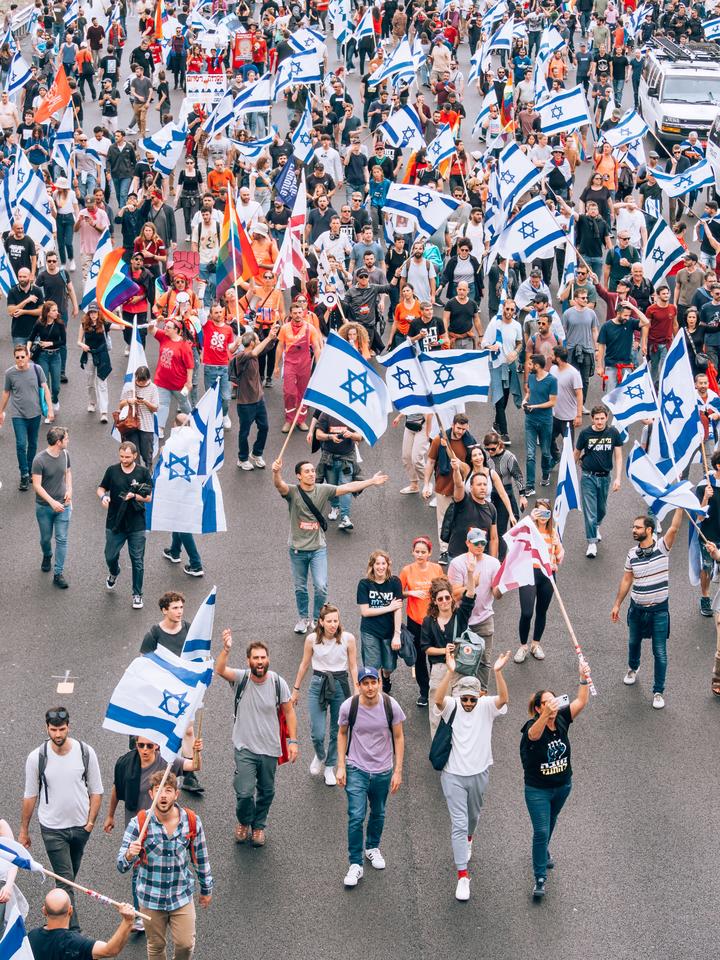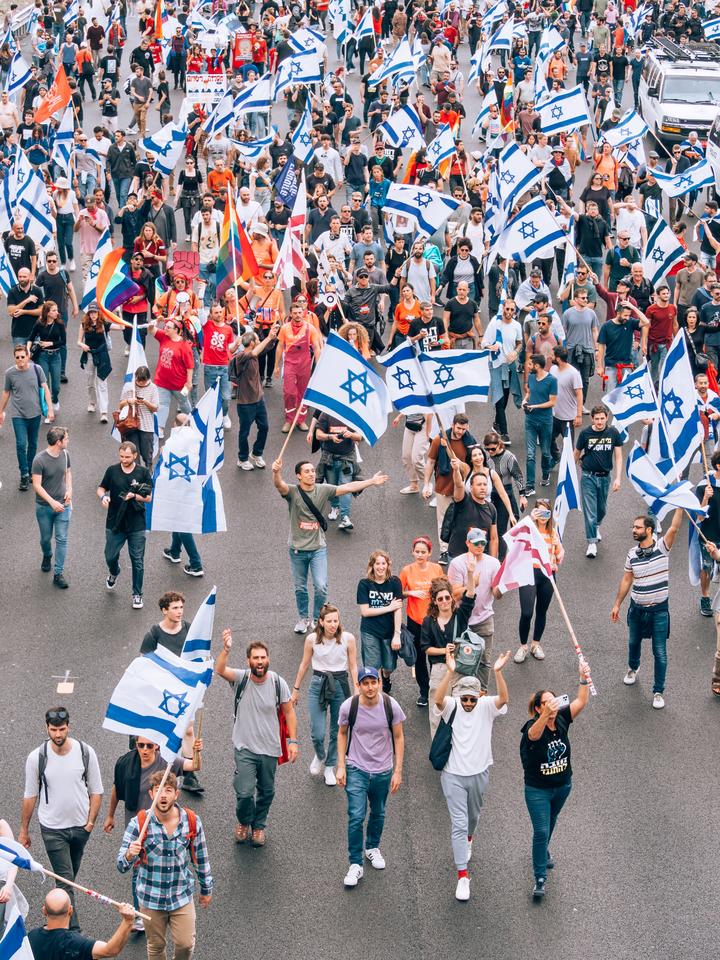By Dan Arbell, American University | –
(The Conversation) –The judicial overhaul plan of Israeli Prime Minister Benjamin Netanyahu’s government, introduced in January, has thrown the country into its most severe domestic crisis since 1973. That crisis intensified on March 26, when Netanyahu fired the country’s defense minister, who had – less than 24 hours before – called on the government to delay its plans to reform the judiciary.
The plan has incited an unprecedented wave of controversy among Israelis, as hundreds of thousands of protestors have gathered for a 12th straight week across the country in opposition to the plan. Yet it’s not simply the persistence and size of the protest that is evidence of the crisis. It’s who is protesting.

Photo by Yoav Aziz on Unsplash
The demonstrations have brought together groups representing almost all sectors of Israeli society. But among protesters is a group of individuals rarely seen at anti-government protests over the country’s almost 75-year history: Israeli Defense Forces reservists. They include former combat pilots, members of elite units and special forces, cyber-security forces and military intelligence, who announced they will not volunteer for reserve duty service if the legislation passes in the Knesset, Israel’s parliament.
Further demonstrating the unprecedented aspect of the response by reservists: Among those protesting are members of Israeli Air Force Squadron 69. All but three of the 40 reservist pilots in the squadron announced that they would not conduct training exercises and would instead join anti-government protests, claiming they are not prepared to serve in what they say would be a “dictatorial regime.”
“We have no contract with a dictator. We would be happy to volunteer when the democracy is safeguarded,” an open letter from the reservists said.
 Photo by Levi Meir Clancy on Unsplash
Photo by Levi Meir Clancy on Unsplash
The highly controversial judicial reform plan would significantly weaken the Israeli judiciary’s oversight over the legislative and executive branches.
The plan calls for near total control over future laws, constitutional amendments and judicial appointments to be concentrated in the hands of the governing coalition in the Knesset. Critics and protesters say the plan undermines the 75-year delicate balance between the three government branches, ends liberal democracy as they know it and pushes Israel towards autocratic rule.
Despite the growing protests, Netanyahu has defiantly promised to push the reforms through the Knesset. As the country inches closer towards a constitutional showdown between the executive and legislative branches and the judicial branch, the presence of former members of elite military units in these protests is evidence that the crisis’ implications extend far beyond the domestic political arena.
Besides threatening to undermine the economy and deepen societal divides, it threatens to erode Israeli national security and provoke a constitutional crisis that could ensnare the military as well.
‘The people’s army’
Israel’s military, known as the “IDF,” has been described for decades as the “people’s army.” That’s because young Israeli men and women, when they turn 18, are mandated by law to serve in the military. Men serve for two years and eight months and women for two years.
Upon completion of their regular military service, men and women are assigned to the reserve forces. The reserves are designed to provide reinforcements during emergencies and maintain preparedness through routine training and security assignments. While the number of Israelis serving as reservists has decreased over the years due to cutbacks and people finding ways to be exempted, reserve military service has been an integral part of the national ethos and folklore.
The threat to the government articulated by the protesting reservists is unprecedented. It represents a powerful step by former military and intelligence officials who pride themselves on their independence from politics and commitment to protocol.
Nevertheless, the reservists’ view is that there is an unwritten contract between those who serve and the state: they are willing to risk their lives to defend a liberal democratic Israel. But if Israel becomes a dictatorship, this contract is null and void.
It is possible that other security services like the police or Shin Bet, the internal security service, will take similar actions to protest the reforms. Depending on how long these protests last, the situation could unfold into an uncharted security crisis with high risks of domestic instability and, as Israeli President Isaac Herzog warned, civil strife.
Defense of democracy – or insubordination?
Minister of Defense Yoav Gallant, addressing the situation on March 25, 2023, expressed deep concern that the heated political debate is infiltrating the rank and file of the IDF. And that, Gallant said, may undermine and jeopardize Israel’s security at a time when the country faces external threats from Iran, Palestinian terrorism and Lebanese Hezbollah.
“The events taking place in Israeli society do not spare the Israel Defense Forces — from all sides, feelings of anger, pain and disappointment arise, with an intensity I have never encountered before,” Gallant said.
Gallant called for an immediate halt in the judicial overhaul legislation process. Instead, he proposed a dialogue between the two sides in order to reach a broadly agreed reform.
Now, Gallant has been fired for his comments. As a veteran of the IDF, a former Israeli diplomat and a longtime analyst of Israel’s security situation, I believe the crisis poses a profound question of where the line is between legal political activism in defense of democracy and insubordination.
The bigger question is what will happen with the military if the legislation passes in the Knesset, but is then struck down by Israel’s supreme court, the High Court of Justice. Should Netanyahu’s government request that institutions like the IDF act in contradiction to decisions made by the High Court, it is unclear to which authority these institutions would adhere.
For example: if the High Court rules that a Jewish outpost in the West Bank was built illegally and needs to be dismantled, yet the government orders the IDF not to do it, what will the IDF commanders on the ground do?
This tension is starkly displayed by the reservists who are refusing to partake in their usual duties.
In light of Gallant’s call to halt the legislation process, it is unclear whether the voting on the changes in the makeup of the Judges Selection Committee, scheduled for the week of March 26, 2023, will take place as planned.
The reservists’ active participation in the protests and their vocal opposition to the government’s plan have clearly made an impact on the defense minister. But at the same time, Gallant came out strongly against insubordination. Undoubtedly, the coming days will be critical in determining the direction of Israeli democracy.
This story has been updated to reflect Israeli Prime Minister Netanyahu’s firing of Defense Minister Yoav Gallant.![]()
Dan Arbell, Scholar-in-residence at the Center for Israeli Studies, American University
This article is republished from The Conversation under a Creative Commons license. Read the original article.



 © 2026 All Rights Reserved
© 2026 All Rights Reserved